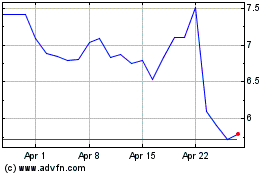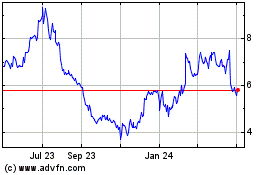Alaska Air Nears Virgin Deal After Frenzied Bidding
April 03 2016 - 8:50PM
Dow Jones News
Alaska Air Group Inc. is expected to announce on Monday that it
won the auction for Virgin America Inc., besting rival JetBlue
Airways Corp. in a frenzied bidding process that culminated in a
cash price of about $2.5 billion, according to people familiar with
the matter.
This new chapter in airline consolidation amid low-fare carriers
comes at a premium. The deal signed Friday night, according to one
of the people, was more than $1 billion over Virgin America's
market capitalization on Friday, which had started to rise last
month on takeover speculation.
Bidding between Alaska Airlines' parent and JetBlue was
feverish, this person said, with the price continuing to rise.
Alaska prevailed in part because of its clean balance sheet, which
will allow it to more easily borrow funds for the acquisition, the
person said.
A person familiar with the jousting said it was "a fierce back
and forth between the two sides, with multiple bids for a number of
days." But ultimately, JetBlue "put the pencil down" because the
price had gotten too high.
Alaska, an 84-year-old airline based in Seattle, has an
investment-grade credit rating, no net debt and $1.3 billion of
cash, according to its latest financial disclosures. JetBlue, which
began flying in 2000, had $876 million of cash at year-end and an
undrawn $600 million credit line. Its debt stood at $1.8 billion.
Due to low fuel prices of late, both are highly profitable.
The combination of Alaska and Virgin America, which is expected
to undergo scrutiny from the U.S. Justice Department, would create
the No. 5 U.S. airline by traffic, eclipsing JetBlue, which
currently holds that spot. But the combined company still would be
very small compared with the largest four U.S. airlines, all
expanded by recent mergers, that control more than 80% of domestic
capacity.
San Francisco-based Virgin America, which began flying in 2007,
is 54%-owned by Richard Branson's Virgin Group Ltd. and New
York-based Cyrus Capital Partners LP. The company went public in
November 2014.
Another person familiar with the situation said Virgin Group
agreed to the sale "because, effectively, they got a good offer"
and because the group's voting rights were weak in order to be
compliant with U.S. regulations that limit foreign entities from
holding more than a certain percentage of a U.S. carrier's
shares.
Cyrus Capital didn't respond to calls for comment.
The addition of Virgin America would materially boost Alaska's
presence at the important California airports in San Francisco and
Los Angeles. The two have only six routes that overlap and their
costs are similar.
For all of 2015, Virgin America's unit cost—the cost to fly a
seat a mile, excluding fuel and profit sharing—was 7.47 cents.
Alaska's unit cost in its jet division, excluding its commuter
planes, was 7.39 cents.
Dubbed an industry hybrid, Alaska is one of the few
pre-deregulation airlines to avoid bankruptcy-court protection.
The company, a traditional network airline like its larger
rivals, has been cutting its costs for more than a decade to fight
incursions into its West Coast base by discounter Southwest
Airlines Co. and others.
Today, Alaska has low costs but still offers passengers some
perks without a plethora of fees. It also expanded its route map
and now serves most major markets in the East and Midwest and
recently made a big bet on Hawaii. It routinely wins
customer-service awards, is known for being punctual and enjoys
relative labor peace.
Virgin, which has 57 aircraft, 2,600 employees and carried 7
million passengers last year, only turned profitable in 2013. But
it also wins customer-service awards and has a devoted following in
Silicon Valley. It recently launched service to Hawaii, Denver and
Love Field in Dallas and services transcontinental routes from Los
Angeles and San Francisco to the East Coast.
While Virgin is an Airbus operator and Alaska's jet fleet is
exclusively Boeing Co., some experts don't expect that to matter,
given that the economics of operating a single fleet type diminish
if the second fleet is big enough to bring advantages.
A person familiar with the matter said JetBlue was the better
fit, because of the similarities between its labor relations and
fleet with Virgin America, which would have created superior
synergies.
But Alaska made the "bold move" by bidding up the offer because
it wanted to diversity out of its Seattle base—which is being
encroached by Delta Air Lines Inc.'s buildup there—and add to its
transcontinental route portfolio.
Liz Hoffman
Write to Susan Carey at susan.carey@wsj.com, Robert Wall at
robert.wall@wsj.com and Dana Mattioli at dana.mattioli@wsj.com
(END) Dow Jones Newswires
April 03, 2016 20:35 ET (00:35 GMT)
Copyright (c) 2016 Dow Jones & Company, Inc.
JetBlue Airways (NASDAQ:JBLU)
Historical Stock Chart
From Mar 2024 to Apr 2024

JetBlue Airways (NASDAQ:JBLU)
Historical Stock Chart
From Apr 2023 to Apr 2024
